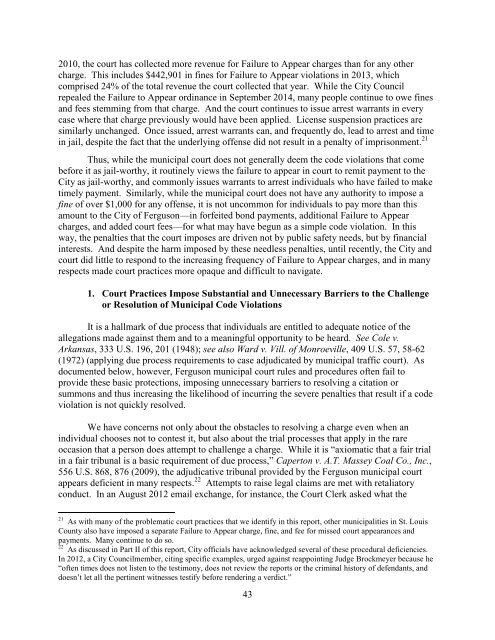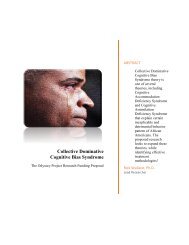U.S. Justice Department Report on the Ferguson Police Department
Ferguson’s law enforcement practices are shaped by the City’s focus on revenue rather than by public safety needs. This emphasis on revenue has compromised the institutional character of Ferguson’s police department, contributing to a pattern of unconstitutional policing, and has also shaped its municipal court, leading to procedures that raise due process concerns and inflict unnecessary harm on members of the Ferguson community.
Ferguson’s law enforcement practices are shaped by the City’s focus on revenue rather than by public safety needs. This emphasis on revenue has compromised the institutional character of Ferguson’s police department, contributing to a pattern of unconstitutional policing, and has also shaped its municipal court, leading to procedures that raise due process concerns and inflict unnecessary harm on members of the Ferguson community.
Create successful ePaper yourself
Turn your PDF publications into a flip-book with our unique Google optimized e-Paper software.
2010, <strong>the</strong> court has collected more revenue for Failure to Appear charges than for any o<strong>the</strong>r<br />
charge. This includes $442,901 in fines for Failure to Appear violati<strong>on</strong>s in 2013, which<br />
comprised 24% of <strong>the</strong> total revenue <strong>the</strong> court collected that year. While <strong>the</strong> City Council<br />
repealed <strong>the</strong> Failure to Appear ordinance in September 2014, many people c<strong>on</strong>tinue to owe fines<br />
and fees stemming from that charge. And <strong>the</strong> court c<strong>on</strong>tinues to issue arrest warrants in every<br />
case where that charge previously would have been applied. License suspensi<strong>on</strong> practices are<br />
similarly unchanged. Once issued, arrest warrants can, and frequently do, lead to arrest and time<br />
in jail, despite <strong>the</strong> fact that <strong>the</strong> underlying offense did not result in a penalty of impris<strong>on</strong>ment. 21<br />
Thus, while <strong>the</strong> municipal court does not generally deem <strong>the</strong> code violati<strong>on</strong>s that come<br />
before it as jail-worthy, it routinely views <strong>the</strong> failure to appear in court to remit payment to <strong>the</strong><br />
City as jail-worthy, and comm<strong>on</strong>ly issues warrants to arrest individuals who have failed to make<br />
timely payment. Similarly, while <strong>the</strong> municipal court does not have any authority to impose a<br />
fine of over $1,000 for any offense, it is not uncomm<strong>on</strong> for individuals to pay more than this<br />
amount to <strong>the</strong> City of Fergus<strong>on</strong>—in forfeited b<strong>on</strong>d payments, additi<strong>on</strong>al Failure to Appear<br />
charges, and added court fees—for what may have begun as a simple code violati<strong>on</strong>. In this<br />
way, <strong>the</strong> penalties that <strong>the</strong> court imposes are driven not by public safety needs, but by financial<br />
interests. And despite <strong>the</strong> harm imposed by <strong>the</strong>se needless penalties, until recently, <strong>the</strong> City and<br />
court did little to resp<strong>on</strong>d to <strong>the</strong> increasing frequency of Failure to Appear charges, and in many<br />
respects made court practices more opaque and difficult to navigate.<br />
1. Court Practices Impose Substantial and Unnecessary Barriers to <strong>the</strong> Challenge<br />
or Resoluti<strong>on</strong> of Municipal Code Violati<strong>on</strong>s<br />
It is a hallmark of due process that individuals are entitled to adequate notice of <strong>the</strong><br />
allegati<strong>on</strong>s made against <strong>the</strong>m and to a meaningful opportunity to be heard. See Cole v.<br />
Arkansas, 333 U.S. 196, 201 (1948); see also Ward v. Vill. of M<strong>on</strong>roeville, 409 U.S. 57, 58-62<br />
(1972) (applying due process requirements to case adjudicated by municipal traffic court). As<br />
documented below, however, Fergus<strong>on</strong> municipal court rules and procedures often fail to<br />
provide <strong>the</strong>se basic protecti<strong>on</strong>s, imposing unnecessary barriers to resolving a citati<strong>on</strong> or<br />
summ<strong>on</strong>s and thus increasing <strong>the</strong> likelihood of incurring <strong>the</strong> severe penalties that result if a code<br />
violati<strong>on</strong> is not quickly resolved.<br />
We have c<strong>on</strong>cerns not <strong>on</strong>ly about <strong>the</strong> obstacles to resolving a charge even when an<br />
individual chooses not to c<strong>on</strong>test it, but also about <strong>the</strong> trial processes that apply in <strong>the</strong> rare<br />
occasi<strong>on</strong> that a pers<strong>on</strong> does attempt to challenge a charge. While it is “axiomatic that a fair trial<br />
in a fair tribunal is a basic requirement of due process,” Capert<strong>on</strong> v. A.T. Massey Coal Co., Inc.,<br />
556 U.S. 868, 876 (2009), <strong>the</strong> adjudicative tribunal provided by <strong>the</strong> Fergus<strong>on</strong> municipal court<br />
appears deficient in many respects. 22 Attempts to raise legal claims are met with retaliatory<br />
c<strong>on</strong>duct. In an August 2012 email exchange, for instance, <strong>the</strong> Court Clerk asked what <strong>the</strong><br />
21 As with many of <strong>the</strong> problematic court practices that we identify in this report, o<strong>the</strong>r municipalities in St. Louis<br />
County also have imposed a separate Failure to Appear charge, fine, and fee for missed court appearances and<br />
payments. Many c<strong>on</strong>tinue to do so.<br />
22 As discussed in Part II of this report, City officials have acknowledged several of <strong>the</strong>se procedural deficiencies.<br />
In 2012, a City Councilmember, citing specific examples, urged against reappointing Judge Brockmeyer because he<br />
“often times does not listen to <strong>the</strong> testim<strong>on</strong>y, does not review <strong>the</strong> reports or <strong>the</strong> criminal history of defendants, and<br />
doesn’t let all <strong>the</strong> pertinent witnesses testify before rendering a verdict.”<br />
43

















